Connect With Us
Blog
Items filtered by date: August 2023
Understanding and Preventing Discomfort From Corns on the Feet
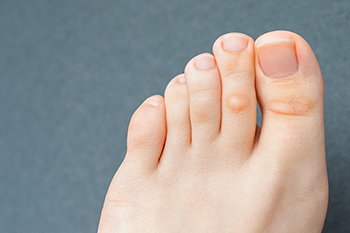
Corns are defined as small, but bothersome, patches of thickened skin, which can quietly disrupt our daily stride. These localized areas of pressure and friction often develop on the feet, particularly over areas that constantly rub against footwear. They are the skin's natural response to protect itself from irritation. However, when left untreated, corns can cause pain and discomfort. Prevention is the key to keeping corns at bay. Choosing shoes that fit well with ample toe room and cushioning can minimize friction. Regularly moisturizing the feet can help to keep skin supple and less prone to developing corns. Wearing orthotic inserts can help to provide proper arch support in addition to distributing pressure evenly. It is beneficial to recognize the importance of preventing corns on the feet, ensuring that each step remains comfortable and pain-free. If you have problematic corns on your feet, it is suggested that you consult with a podiatrist for effective relief options.
Corns can make walking very painful and should be treated immediately. If you have questions regarding your feet and ankles, contact one of our podiatrists of Podiatry Care Specialists. Our doctors will treat your foot and ankle needs.
Corns: What Are They? And How Do You Get Rid of Them?
Corns are thickened areas on the skin that can become painful. They are caused by excessive pressure and friction on the skin. Corns press into the deeper layers of the skin and are usually round in shape.
Ways to Prevent Corns
There are many ways to get rid of painful corns such as:
- Wearing properly fitting shoes that have been measured by a professional
- Wearing shoes that are not sharply pointed or have high heels
- Wearing only shoes that offer support
Treating Corns
Although most corns slowly disappear when the friction or pressure stops, this isn’t always the case. Consult with your podiatrist to determine the best treatment option for your case of corns.
If you have any questions please feel free to contact our offices located in West Chester, and Broomall, PA . We offer the newest diagnostic and treatment technologies for all your foot and ankle needs.
Causes, Symptoms, and Possible Relief Options for Plantar Fasciitis
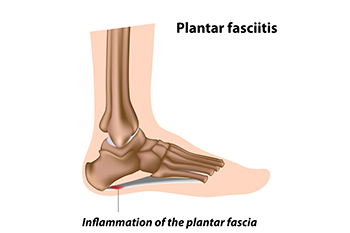
Plantar fasciitis, a common and often distressing foot condition, can disrupt daily routines with its sharp heel pain. This ailment arises from inflammation of the plantar fascia, which is the tissue connecting the heel bone to the toes. Causes can vary, including repetitive stress, wearing poor-fitting footwear, and obesity. Symptoms can manifest as intense pain upon waking or after periods of rest, and gradually easing with movement. Relief techniques can include performing stretching exercises targeting the calf muscles and plantar fascia, helping to relieve tension. Orthotic shoe inserts can provide support and distribute pressure. Taking anti-inflammatory medications can be beneficial, and for more severe cases, medical interventions such as surgery may be considered. By addressing the underlying triggers and adopting a combination of remedies, individuals can gradually step back into pain-free mobility. If you have heel pain, it is strongly suggested that you are under the care of a podiatrist who can effectively treat plantar fasciitis.
Plantar fasciitis is a common foot condition that is often caused by a strain injury. If you are experiencing heel pain or symptoms of plantar fasciitis, contact one of our podiatrists from Podiatry Care Specialists. Our doctors can provide the care you need to keep you pain-free and on your feet.
What Is Plantar Fasciitis?
Plantar fasciitis is one of the most common causes of heel pain. The plantar fascia is a ligament that connects your heel to the front of your foot. When this ligament becomes inflamed, plantar fasciitis is the result. If you have plantar fasciitis you will have a stabbing pain that usually occurs with your first steps in the morning. As the day progresses and you walk around more, this pain will start to disappear, but it will return after long periods of standing or sitting.
What Causes Plantar Fasciitis?
- Excessive running
- Having high arches in your feet
- Other foot issues such as flat feet
- Pregnancy (due to the sudden weight gain)
- Being on your feet very often
There are some risk factors that may make you more likely to develop plantar fasciitis compared to others. The condition most commonly affects adults between the ages of 40 and 60. It also tends to affect people who are obese because the extra pounds result in extra stress being placed on the plantar fascia.
Prevention
- Take good care of your feet – Wear shoes that have good arch support and heel cushioning.
- Maintain a healthy weight
- If you are a runner, alternate running with other sports that won’t cause heel pain
There are a variety of treatment options available for plantar fasciitis along with the pain that accompanies it. Additionally, physical therapy is a very important component in the treatment process. It is important that you meet with your podiatrist to determine which treatment option is best for you.
If you have any questions, please feel free to contact our offices located in West Chester, and Broomall, PA . We offer the newest diagnostic and treatment technologies for all your foot care needs.
Unmasking the Causes of Athlete’s Foot
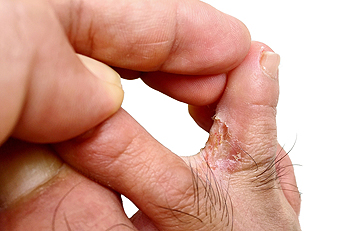
Athlete's foot, medically known as tinea pedis, is a common fungal infection that primarily affects the feet. This condition is caused by various dermatophyte fungi that thrive in warm, damp environments like communal showers, swimming pools, and locker rooms. The fungus can also spread through contact with infected individuals or contaminated surfaces. Certain factors increase the risk of developing athlete's foot. Athletes, hence the name, are particularly vulnerable due to the frequent use of communal spaces. In addition, individuals who wear tight-fitting shoes or synthetic socks that trap moisture are at higher risk. Maintaining proper foot hygiene, wearing breathable footwear, and avoiding prolonged exposure to damp conditions are essential preventive measures. If you have developed athlete’s foot, it is suggested that you consult a podiatrist who can guide you toward effective treatment measures.
Athlete’s foot is an inconvenient condition that can be easily reduced with the proper treatment. If you have any concerns about your feet and ankles, contact one of our podiatrists from Podiatry Care Specialists. Our doctors will treat your foot and ankle needs.
Athlete’s Foot: The Sole Story
Athlete's foot, also known as tinea pedis, can be an extremely contagious foot infection. It is commonly contracted in public changing areas and bathrooms, dormitory style living quarters, around locker rooms and public swimming pools, or anywhere your feet often come into contact with other people.
Solutions to Combat Athlete’s Foot
- Hydrate your feet by using lotion
- Exfoliate
- Buff off nails
- Use of anti-fungal products
- Examine your feet and visit your doctor if any suspicious blisters or cuts develop
Athlete’s foot can cause many irritating symptoms such as dry and flaking skin, itching, and redness. Some more severe symptoms can include bleeding and cracked skin, intense itching and burning, and even pain when walking. In the worst cases, Athlete’s foot can cause blistering as well. Speak to your podiatrist for a better understanding of the different causes of Athlete’s foot, as well as help in determining which treatment options are best for you.
If you have any questions please feel free to contact our offices located in West Chester, and Broomall, PA . We offer the newest diagnostic and treatment technologies for all your foot and ankle needs.
Keep Your Feet Healthy So You Can Stay Active
Essential Tips for Diabetic Foot Care
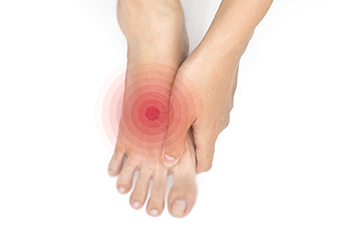
For individuals with diabetes, a proper foot care routine is crucial to managing their health. High blood sugar levels can damage nerves and reduce blood flow to the feet, increasing the risk of complications. A diabetic foot care routine can begin with washing your feet daily with mild soap and warm water and ensuring thorough drying, especially between the toes, to prevent infections. This can be followed by examining the feet every day for any cuts, blisters, redness, or swelling. Early detection of problems is essential for timely intervention. It is vital to keep the skin hydrated by applying moisturizer. Wearing proper shoes can help the feet to feel comfortable, and it is beneficial to refrain from walking barefoot. Trim the nails straight across instead of in a curved fashion to prevent ingrown toenails. If you have diabetes, it is strongly suggested that you are under the care of a podiatrist trained to deal with complications from this diabetes.
Diabetic foot care is important in preventing foot ailments such as ulcers. If you are suffering from diabetes or have any other concerns about your feet, contact one of our podiatrists from Podiatry Care Specialists. Our doctors can provide the care you need to keep you pain-free and on your feet.
Diabetic Foot Care
Diabetes affects millions of people every year. The condition can damage blood vessels in many parts of the body, especially the feet. Because of this, taking care of your feet is essential if you have diabetes, and having a podiatrist help monitor your foot health is highly recommended.
The Importance of Caring for Your Feet
- Routinely inspect your feet for bruises or sores.
- Wear socks that fit your feet comfortably.
- Wear comfortable shoes that provide adequate support.
Patients with diabetes should have their doctor monitor their blood levels, as blood sugar levels play such a huge role in diabetic care. Monitoring these levels on a regular basis is highly advised.
It is always best to inform your healthcare professional of any concerns you may have regarding your feet, especially for diabetic patients. Early treatment and routine foot examinations are keys to maintaining proper health, especially because severe complications can arise if proper treatment is not applied.
If you have any questions please feel free to contact our offices located in West Chester, and Broomall, PA . We offer the newest diagnostic and treatment technologies for all your foot and ankle needs.
Causes of Achilles Tendon Pain
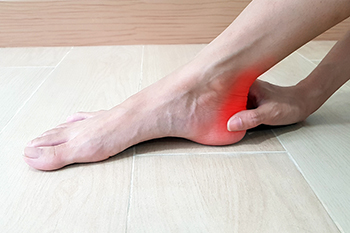
The strong band of tissue that runs from the calf muscles to the heel bone is known as the Achilles tendon. When this tendon is overused, which is frequent among runners, dancers, and other athletes, it can become inflamed and extremely painful. This condition is called Achilles tendinopathy. The top cause of Achilles tendinopathy is overuse, which tears or stretches the tendon and causes inflammation. Other causes include certain types of arthritis, flat feet, and overpronation. In addition, wearing shoes that lack adequate support, being overweight, and taking certain antibiotics may increase the likelihood of developing Achilles tendinopathy. There are a number of treatments available for Achilles tendinopathy, but healing time depends on the severity of the injury. In some cases, surgery is required. There are several ways to prevent tendinopathy, including stretching exercises and warmup and cool-down routines. Wearing proper footwear is another way to help prevent this injury. For more information, it is suggested that you consult a podiatrist.
Achilles tendon injuries need immediate attention to avoid future complications. If you have any concerns, contact one of our podiatrists of Podiatry Care Specialists. Our doctors can provide the care you need to keep you pain-free and on your feet.
What Is the Achilles Tendon?
The Achilles tendon is a tendon that connects the lower leg muscles and calf to the heel of the foot. It is the strongest tendon in the human body and is essential for making movement possible. Because this tendon is such an integral part of the body, any injuries to it can create immense difficulties and should immediately be presented to a doctor.
What Are the Symptoms of an Achilles Tendon Injury?
There are various types of injuries that can affect the Achilles tendon. The two most common injuries are Achilles tendinitis and ruptures of the tendon.
Achilles Tendinitis Symptoms
- Inflammation
- Dull to severe pain
- Increased blood flow to the tendon
- Thickening of the tendon
Rupture Symptoms
- Extreme pain and swelling in the foot
- Total immobility
Treatment and Prevention
Achilles tendon injuries are diagnosed by a thorough physical evaluation, which can include an MRI. Treatment involves rest, physical therapy, and in some cases, surgery. However, various preventative measures can be taken to avoid these injuries, such as:
- Thorough stretching of the tendon before and after exercise
- Strengthening exercises like calf raises, squats, leg curls, leg extensions, leg raises, lunges, and leg presses
If you have any questions please feel free to contact our offices located in West Chester, and Broomall, PA . We offer the newest diagnostic tools and technology to treat your foot and ankle needs.

